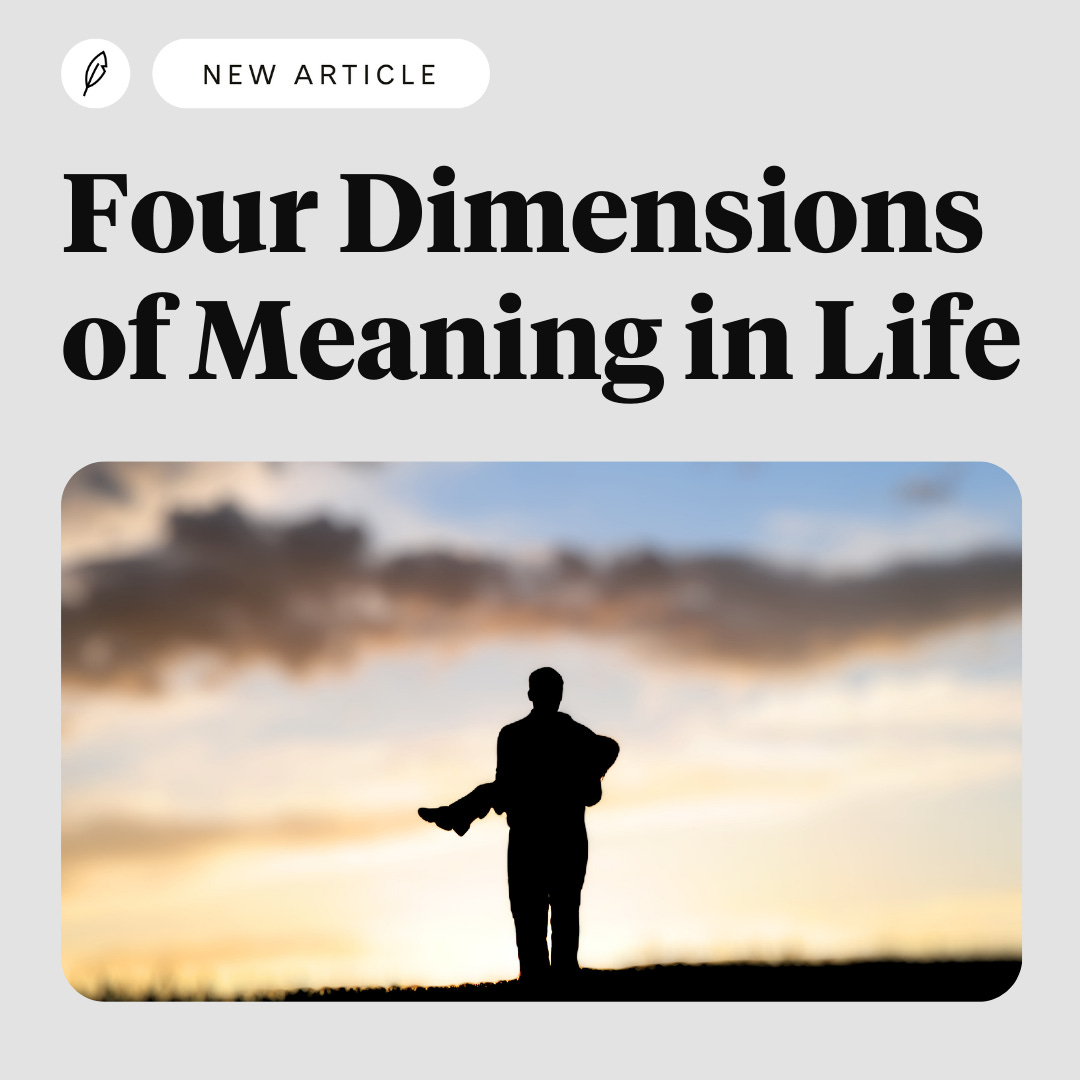Four Dimensions of Meaning in Life
Introduction to a new series on the Wisdom Dojo
Meaninglessness inhibits fullness of life and is therefore equivalent to illness. Meaning makes a great many things endurable—perhaps everything.
– C.G. Jung, Memories, Dreams, Reflections
A long month of walking across Spain on the Camino De Santiago has finally passed. The walking offered plenty of time for reflection and this series was at the forefront of my mind upon returning to Ireland, on the topic of Meaning in Life.
There’s nothing more precious than meaning in life and yet, it’s in such short supply these days? Everywhere we look online there seems to be nihilism, cynicism, alienation, despair, and general, meaninglessness? So I figured a new series looking at the psychology and philosophy of Meaning in Life, could be a good way to spend my time (and yours).
The Meaning Crisis.
I wrote a lot about the Meaning Crisis in the previous series (particularly essay three, giving a brief overview of the genealogy from Vervaeke’s work) However, as a brief summary, in Existential Indifference, Tatjana Schnell writes,
“Meaningfulness is defined as a fundamental sense of meaning, based on an appraisal of one’s life as coherent, significant, directed, and belonging. A judgment on one’s life as empty, pointless, and lacking meaning amounts to a crisis of meaning. Although sources of meaning significantly predict both meaningfulness and crisis of meaning, they cannot fully account for them.” (2010, 354)
Christopher Masterpietro writes in ‘A Symptomology of the Meaning Crisis’ that the meaning crisis is a state of meaninglessness. Victor Frankl, Austrian psychologist and holocaust survivor described this state of meaninglessness as an 'existential vacuum’. The philosophy of the twentieth century was deeply focused on this existential vacuum, and the problem of how we could live meaningful lives in the new scientific universe after the loss of the religious cosmos? And the various social and political and spiritual consequences of living in a dead world? However, Twentieth-century philosophy still hasn’t gotten us out of the existential vacuum. In the meantime, a broad field of ‘Meaning in Life’ has developed rapidly in psychology and with great practical application.
Science & Meaning in Life.
The scientific conceptualisation of meaning in life considers it a three-part construct, defined as:
“[T]he extent to which one's life is experienced as making sense, as being directed and motivated by valued goals, and as mattering in the world.” (George, L., & Park, C. L, 2016)
This definition can be broken down into three sub-components:
Comprehension (or coherence): the degree to which people perceive a sense of coherence and understanding regarding their own lives (not absurd).
Purpose: the extent to which people experience life as being directed and motivated by valued life goals.
Mattering (or significance): the degree to which people feel their existence is significant, important, and of value to the world (George & Park, 2016).
To this triumvirate, John Vervaeke, Canadian Cognitive Scientist and meaning expert, adds a fourth dimension called Depth.
He defines the dimension of depth as,
“a sense that one’s life has depth or realness because it connects one to something larger than oneself that has a value and a reality beyond one’s egocentric concerns and individual existence.”
John Vervaeke
Introducing The Series.
People who believe their lives have meaning are happier, have higher life satisfaction, are more engaged in their work, have a better immune system and buffer against stress, and live longer in general
(Steger, 2021).
Over the coming weeks, we will look at the four dimensions of meaning in life individually and in detail: comprehension, depth, purpose and mattering.
Each week we will break down the psychology and philosophy behind one dimension, the various existential woes that result from lacking a dimension in your life, and finally, exploring ways and strategies to enhance this dimension and meaning in day-to-day.
If you think others will be interested in this meaning series then please send this message and encourage them to subscribe below to get the weekly emails for free 👇
(If you are already signed up to the Wisdom Dojo then make sure to star this email in your email inbox so the series doesn’t end up in your spam!)
Warm regards,
Mahon.
ESSAY TWO:
Bibliography:
Schnell, T. ( 2008a). Existential indifference: Attributes of a new category of meaning in life. International Journal of Psychology, 43, 695.
Frankl, Victor. 1959, 2006. Man’s Search for Meaning. Boston: Beacon Press.
Verveake & Masterpietro (2020). Diagnosing the Current Age: A Symptomology of the Meaning Crisis. The Side View. Access: https://thesideview.co/journal/diagnosing-the-current-age/
George, L., & Park, C. L. (2016). Meaning in life as comprehension, purpose, and mattering: Toward integration and new research questions. Review of General Psychology, 20, 205-220.
Steger, M. F. (2021). Meaning in life: A unified model. In C. R. Snyder, S. J. Lopez, L. M. Edwards, & S. C. Marques (Eds.), The Oxford handbook of positive psychology (pp. 959–967). Oxford University Press.


